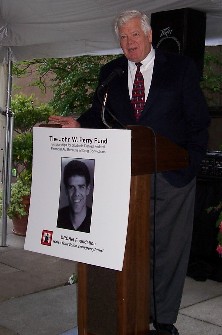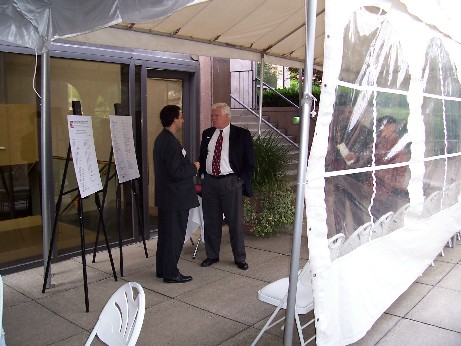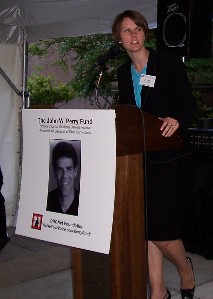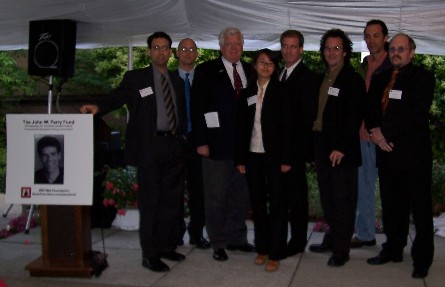Feature:
US
Congressman
Criticizes
Drug
War
at
John
W.
Perry
Fund
Reception
in
Seattle
6/3/05
Rep. Jim McDermott, the high-profile US Congressman from Seattle, took a first step in making opposition to the drug war an active priority in a speech delivered to a Seattle gathering last Wednesday night.
In addition to Rep. McDermott, Seattle City Councilman Nick Licata attended, and US Sen. Maria Cantwell (D) sent a representative to read a statement in support of the Perry Fund and the broader effort to repeal the federal law that makes it necessary, the Higher Education Act's drug provision, the 1998 brainchild of arch-drug warrior Indiana Republican Rep. Mark Souder. Also in attendance was much of the leadership of Seattle's groundbreaking drug reform community, including KCBA's Roger Goodman, who emceed the event, and civic leaders from the League of Women Voters and other organizations involved with KCBA's drug policy reform efforts. Under the HEA drug provision, more than 165,000 students have been denied loans, grants, even work-study jobs. Since the provision's passage, a campaign initiated by DRCNet has seen more than 200 educational, civil rights, drug reform and religious groups take a stand against the law in an effort to undo the damage, many of them under the umbrella of the Coalition for Higher Education Act Reform. Additionally, more than 115 student governments have passed resolutions calling for the law's repeal. A bill sponsored by Rep. Barney Frank (D-MA) to repeal the provision, HR 1184, now has 66 cosponsors in the House of Representatives, including Rep. McDermott. In the meantime, there's the Perry Fund. Named after a New York City policeman, ACLU and Libertarian Party activist who also held a law degree and died attempting to rescue people from the 2001 attacks on the World Trade Center, since fall 2003 the Fund has made it possible for a small number of HEA drug provision victims to go to school and raised awareness of the provision in the process.
Clarkson Reed, a substance abuse counselor and harm reduction advocate from nearby Lynnwood, Washington, put a local face on the problem. After serving a five-year prison sentence "for $640 worth of drugs," Reed went to school. "I was lucky enough to get into the University of Washington, where I graduated with honors, and since then I've been working on chemical dependency issues," he told the crowd. "I graduated in 1997 [before the drug provision was passed], but when I tried to go back later to get my master's degree, now I couldn't get the student loans." Reed works with homeless youth and injection drug users. "I'm doing harm reduction work, and I wouldn't have been able to do that without the education I received," he said. "There are so many people out there trying to change their lives -- they got in trouble over a little marijuana or something -- but when they're ready and willing to help themselves, this law throws an obstacle in their paths." Reed was followed by keynote speaker Rep. McDermott, much to the delight of his Seattle constituents. Calling the war on drugs "an absolute, abject failure" and situating the HEA drug provision squarely within that broader policy, Rep. McDermott lashed out at what he described as "a misguided missile launched from Congress." "It's fair to say we are losing this war, this war on Americans in our own communities who made a mistake, paid the price, and are now blocked from becoming productive members of society," McDermott said. "It's the biggest mistake Congress has made in years."
"This provision has created a staggering cost to society, with 165,000 students who have been affected so far, who have already paid for their offenses," McDermott wound down. "That is why a number of my colleagues put together HR 1184, a return to a sane and sound policy. This provision is such a patent inequity, there is no answer but repeal." McDermott's active participation impressed prominent Seattle marijuana reform activist Dominic Holden, who, along with other Seattle reformers has been trying for years to get the congressman to come out for an event. "After years of general support for drug reform, McDermott's presence at this event demonstrates his commitment to actively participate with the movement," said Holden. "And he's not just a supporter of drug reform as good policy, but he is very passionate and thoughtful on a very humane level about the negative effects of the drug war. He wants change because it's better for the country, not for any political benefit." McDermott's participation in the Wednesday fundraiser will have an effect beyond raising scholarship money for affected students, said Holden. "The funds raised tonight were valuable for those kids who will be able to use them to go to college, but for the drug reform movement as a whole the work that DRCNet has done to enlist our congressman will last much longer." McDermott was followed by Lisa Cipollone, director of Sen. Maria Cantwell's King County office, who read a statement from Cantwell thanking the Coalition for Higher Education Act Reform and the John W. Perry Fund and promising to continue working on the issue. "Having the chance to go to college should not be restricted due to an individual's past mistakes, including drug offenses," Cantwell wrote, continuing "The drug provision places undue restrictions on financial aid and must be repealed."
Following Ko was Center for Social Justice executive director Dan Merkle, who described the war on drugs as part of a broader repressive policy. "These policies are designed to provide a tool for the elites to repress troublesome subject populations," Merkle said. The HEA drug provision is part and parcel of that policy, said Merkle. And representing the current generation of students was Cindy Beavon, a Seattle native attending Brown University in Rhode Island, where she is active with Students for Sensible Drug Policy. "It is time for the DARE generation to stand up and say we can no longer tolerate this war being fought in our name," Beavon said. She then thanked Rep. Souder, the author of the drug provision. "Without your help," she said, "SSDP would not have developed into the multi-faceted organization it is today," Beavon said to laughs and cheers. Then it was time for people to put pen to checkbook for the cause. Encouraged by DRCNet associate director David Guard, who cajoled attendees to be generous, Seattle area donors kicked in enough to provide scholarships for two or three students this year. Backing him up was John Perry's mother, Patricia, who was not able to attend in person but was there in spirit -- as well as checkbook, having pledged a $1,000 donation in honor of the event in hopes of spurring increased donations from attendees. "A friend of mine from Seattle called McDermott a 'rock star' when I told him he was speaking for us, and now I understand why people here appreciate him so much," Borden said. "McDermott didn't just say things we wanted to hear about the issue; he did his best to rev people up to donate and to believe they can change things. And he was actively interested in talking to people and hearing about how the Fund and the campaign had gotten started." Event proceeds so far exceed $2,500, according to Borden, with more expected. And he predicts having "at least $10,000 to give away in 2005-2006, hopefully $20,000, a substantial increase over previous school years." And if sufficient to help but a few students, enough at least to make a statement. In the meanwhile, the Perry Fund will continue its meandering event series -- Los Angeles, New York City and Santa Fe are possible next stages.
|




